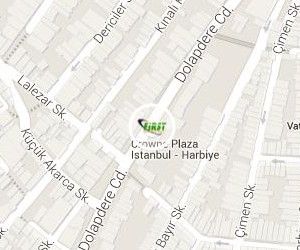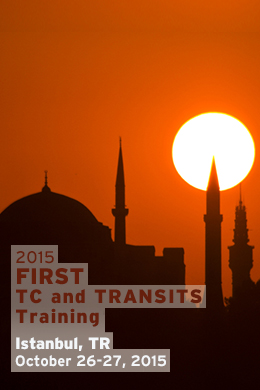Istanbul TC/TRANSITS Training
Istanbul (TUR), 26 – 27 October, 2015
The first annual Cybersecurity for Developing Nations Conference and FIRST TC is one of the premier conferences in the world of development. Sponsored by the United Nations Development Programme, the European Union and FIRST, the conference provides an open forum for development policy decision makers in government, academia, private industry and NGOs to discuss their ideas for improving cybersecurity and resiliency for critical national infrastructure in developing nations. The event also features a TC/technical track designed to build capacity in the critical skills of cyber-incident response. Participants in the technical workshop, TRANSITS, will not only receive training in incidence response but will be certified as TRANSITS trainers, which they can then use to train others in their home countries.
The event will take place Oct 26-27 in beautiful Istanbul, the most populous city in Turkey and a cultural and financial hub for the region. The event will be held at the recently built Crowne Plaza Hotel located in the Sisli district of Istanbul. After the first day of the conference, participants will be able to network with their counterparts and view the beauty of the night-time city during an evening dinner cruise along the Bosphorus.
There is no registration fee and the only fee paid in advance is 50 USD by those wishing to attend the evening dinner cruise.
Who should attend
Persons working in cybersecurity, resilience and development policy from governments of developing nations, academia, private industry and non-governmental development organisations. Participants from around the world will be attending the event.
About FIRST
Founded in 1990, FIRST consists of internet emergency response teams from more than 200 corporations, government bodies, universities and other institutions from the Americas, Asia, Europe, Africa and Oceania. It leads the world's fight-back against cyber-crime, sabotage and terrorism, and promotes cooperation among computer security incident response teams and law enforcement agencies.
About United Nations Development Programme (http://www.undp.org/)
UNDP works in more than 170 countries and territories, helping to achieve the eradication of poverty, and the reduction of inequalities and exclusion. UNDP helps countries to develop policies, leadership skills, partnering abilities, institutional capabilities and build resilience in order to sustain development results. Working in the areas of sustainable development, democratic governance and peace building, and climate and disaster resilience, UNDP offers a global perspective and local insights to help empower lives and build resilient nations.
About "ENCYSEC" Project
Project "Enhancing Cyber Security" is funded by the European Union's Instrument contributing to Stability and Peace (IcSP). The project aims to increase the security and resilience of Information Communication Technologies networks in selected countries by building local capacities to adequately prevent, respond to and prosecute cyber attacks and/or accidental failures. The geographical scope of the project expands over selected countries in Western Balkans and South East Europe, namely the Former Yugoslav Republic of Macedonia (FYROM), Kosovo and Moldova and is implemented by the consortium Expertise France - CIVI.POL Conseil.
Location
Click on the map to see it enlarged on Google Maps.
Click on the map to see it enlarged on Google Maps.
The event will be held at the Crowne Plaza Istanbul - Harbiye, located at:
Dolapdere Caddesi, 161
Istanbul - Turkey
Event Summary
| Date | Session |
|---|
| Mon Oct-26th | Plenary Day / TRANSITS Training* / Social Event (evening TBD) |
| Tue Oct-27th | Plenary Day / TRANSITS Training* |
(*) TRANSITS is a two-day technical training (participants will attend Monday and Tuesday)
TRANSITS Training
The following topics will be covered in the TRANSITS I Course:
Organisation - Covers how CERT/CSIRTs fit within their organisations and includes planning the team, defining its constituency, determining which services to offer, staffing, communicating with external parties, funding, and obtaining management authority.
Technical - Covers how intruders attack systems and their motivations, how network protocols can be abused, vulnerabilities of operating systems and services, denial-of-service attacks, hiding traces, and information gathering techniques. Includes several practical exercises.
Operational - Covers the incident handling process from initial reports, through triage, investigation, resolution, closure, to post-analysis. Includes practical exercises and a survey of useful tools.




